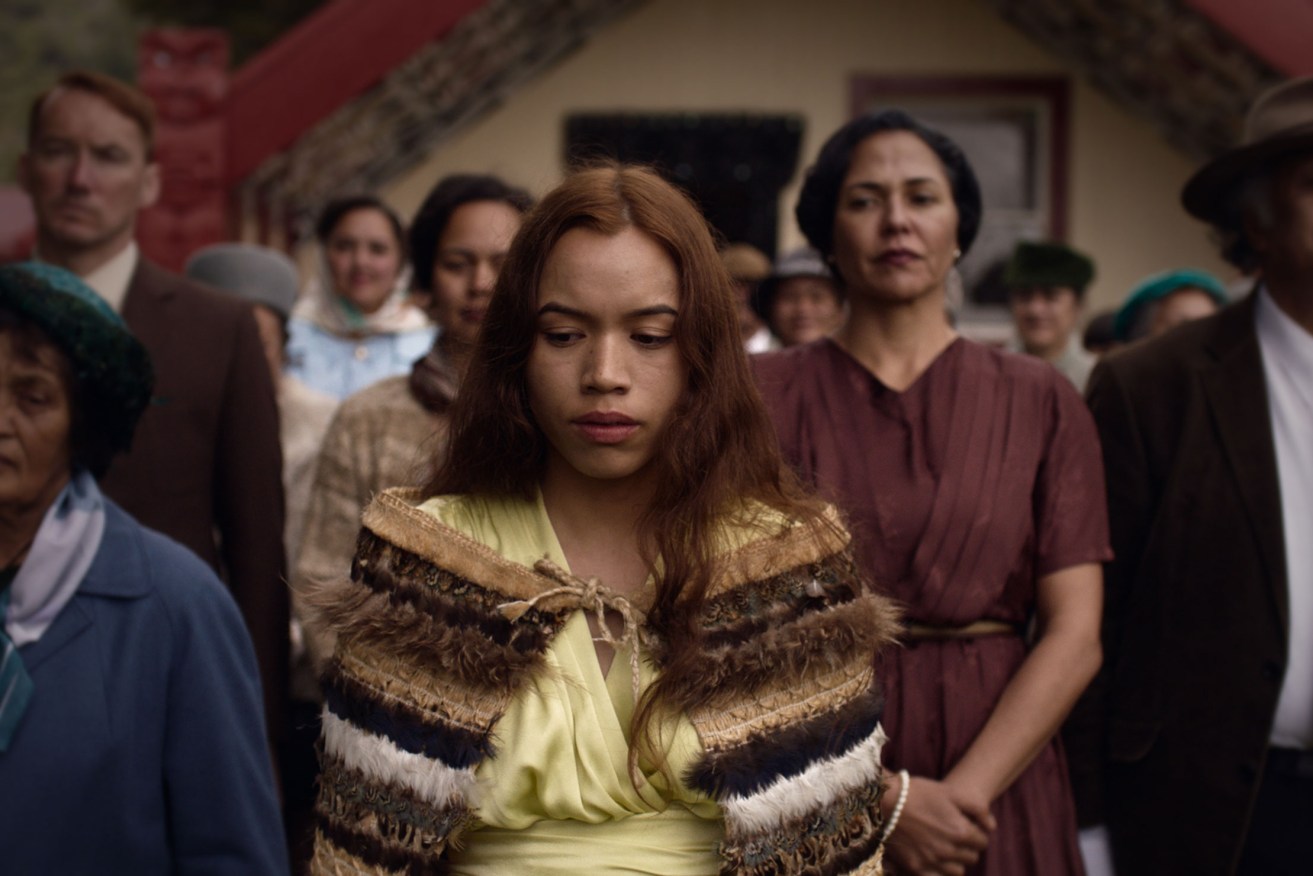Maori women find their voice in powerful new film
The stark drama and lyricism of Cousins make it an unusual and powerful film that shines a light on a new wave of New Zealand filmmakers, most of whom are women.


A betrothal scene involving Missy (Hariata Moriarty) filmed at Te Waiiti Marae at Rotorua.
The adaptation of a much-loved 1992 novel took 16 years to get to the screen and began with the late Merata Mita, the first Māori woman to write and direct a feature film. But the times were against Mita, who died in 2010, and she battled her gender as well as resistance to the film’s style and its story about the institutionalised theft of a Māori child.
It took more than a decade for writer, director and actor Briar Grace-Smith to finally make it happen and she was so involved she co-wrote the script, directed the film and took on a lead role after another actor had to drop out.
“What was immediately apparent was that it was a story about Māori women so it felt incredible not just because of the story but also in our act of making,” Grace-Smith says from her home in Rotorua. “It felt very important.”
Almost as a dress rehearsal for taking on Cousins, Grace-Smith had co-directed the composite feature Waru, made up of eight 10-minute short films linked in various ways through the death of a child. Released in 2017, all of the stories were directed by Māori women.
“These things gradually shifted the earth and for whatever reason people felt that these stories would be watched and that we were quite capable of making them,” Grace-Smith says.
Through her work at the New Zealand Film Commission, Grace-Smith knew of Mita’s unsuccessful attempts to make Cousins and she was close to the story through her family position at the time as the daughter-in-law of the book’s author, Patricia Grace. She was acutely aware of the difficulty of making a film that focused on a central figure, Mata, the child of a Māori mother and an abusive white father, but also included the sisters Makareta, raised to be the princess of her tribe, and the warm and uncomplicated Missy, who is the family’s heartbeat.
After leaving the Film Commission, she knew the project was sitting there languishing and approached filmmaker Ainsley Gardiner (The Breaker Upperers), who joined her as a producer. Grace-Smith says she already knew she wanted to write the script but was too scared to say so.
“We are very polite over here,” she laughs. “Ainsley kept asking me if I knew of any writers until one day I said, ‘Would you mind if I wrote it?’.”
Gardiner, of course, had been too polite to ask.

Briar Grace-Smith as the older Makareta in Cousins – she stepped into the role after the original actor became too ill to continue.
The story of a stolen child in New Zealand is common enough but not as entrenched as in Australia, where authorities routinely removed Indigenous children in a practice that created The Stolen Generation. Māori and Pākehā relations in New Zealand had been shaped since 1840 by the Treaty of Waitangi, which acknowledged Māori rights, particularly as chieftains of their land, even when its terms were often abused and overlooked.
“The removal of children was very common but it was nothing near what happened to Indigenous people in Australia,” Grace-Smith says. “But do you know what, since the screening of the film I have learnt that it is still going on, children are still being taken out of homes and put into foster care, and then not treated well. There have been several cases in the public eye here since the film.”
The themes of grief and dislocation are depicted powerfully by Mata, who on the surface accepted her separation and tries to fit in but cannot sustain relationships and ends up drifting on the streets. But the film’s real power lies in its portrayal of the exotic beauty and strength of Māori culture with its sustaining rituals, blood relations and lineage through land ties. Without them, Mata was nobody.
“Of course, there’s been lots of loss but the interesting thing about our people is that we still start off by introducing ourselves through our canoe, our mountain, our river, the place we come from, our ancestors and the last thing we introduce is ourselves,” Grace-Smith says. “We are all about connection.”

Rachel House (from Hunt for the Wilderpeople) plays the older Missy in Cousins.
Filming in Rotorua was a constant juggle and Gardiner and Grace-Smith, who worked together on Waru, upskilled themselves as directors even while Cousins was being made. Grace-Smith, a former theatre actor, had not been on stage for decades but also stepped in when Nancy Brunning, who was to play the older Makareta, became too ill to continue (she died in November 2019).
“We all held onto her for as long as we could, we even adapted the part so she would be able to do it in a wheelchair but it came to the point where we had to let go,” Grace-Smith says.
The film is emotional, in its making and on screen where the dimensions of the loss feel authentic, and it includes Māori elders from Rotorua who at times improvised their own dialogue.
It is inevitably political in its focus on the legacy of the loss of culture and land, although Grace-Smith says black and white relations in New Zealand have improved since the election of Jacinda Ardern, whose daughter has a Māori middle name
“She is a lot more sympathetic and she is a listening Prime Minister,” Grace-Smith says.
Cousins will be in cinemas from June 10.




